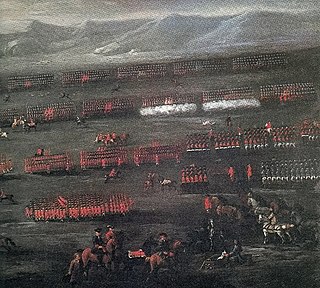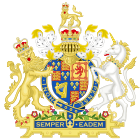
The Act of Settlement is an Act of the Parliament of England that settled the succession to the English and Irish crowns to only Protestants, which passed in 1701. More specifically, anyone who became a Roman Catholic, or who married one, became disqualified to inherit the throne. This had the effect of deposing the remaining descendants of Charles I, other than his Protestant granddaughter Anne, as the next Protestant in line to the throne was Sophia of Hanover. Born into the House of Wittelsbach, she was a granddaughter of James VI and I from his most junior surviving line, with the crowns descending only to her non-Catholic heirs. Sophia died shortly before the death of Queen Anne, and Sophia's son succeeded to the throne as King George I, starting the Hanoverian dynasty in Britain.

Sophia of Hanover was the Electress of Hanover by marriage to Elector Ernest Augustus and later the heiress presumptive to the thrones of England and Scotland and Ireland under the Act of Settlement 1701, as a granddaughter of James VI and I. Princess Sophia died less than two months before she would have become Queen of Great Britain and Ireland. Consequently, her son, George I, succeeded her first cousin once removed, Queen Anne, to the British throne, and the succession to the throne has since been defined as, and composed entirely of, her legitimate and Protestant descendants.

George II was King of Great Britain and Ireland, Duke of Brunswick-Lüneburg (Hanover) and a prince-elector of the Holy Roman Empire from 11 June 1727 (O.S.) until his death in 1760.

George I was King of Great Britain and Ireland from 1 August 1714 and ruler of the Electorate of Hanover within the Holy Roman Empire from 23 January 1698 until his death in 1727. He was the first British monarch of the House of Hanover as the most senior Protestant descendant of his great-grandfather James VI and I.

The House of Hanover, whose members are known as Hanoverians, is a European royal house of German origin that ruled Hanover, Great Britain, and Ireland at various times during the 17th to 20th centuries. The house originated in 1635 as a cadet branch of the House of Brunswick-Lüneburg, growing in prestige until Hanover became an Electorate in 1692. George I became the first Hanoverian monarch of Great Britain and Ireland in 1714. At Queen Victoria's death in 1901, the throne of the United Kingdom passed to her eldest son Edward VII, a member of the House of Saxe-Coburg and Gotha. The last reigning members of the House of Hanover lost the Duchy of Brunswick in 1918 when Germany became a republic.

The Royal Marriages Act 1772 was an Act of the Parliament of Great Britain which prescribed the conditions under which members of the British royal family could contract a valid marriage, in order to guard against marriages that could diminish the status of the royal house. The right of veto vested in the sovereign by this Act provoked severe adverse criticism at the time of its passage.
The Act of Security 1704 was a response by the Parliament of Scotland to the Parliament of England's Act of Settlement 1701. Queen Anne's last surviving child, William, Duke of Gloucester, had died in 1700, and both parliaments needed to find a Protestant successor. The English Parliament had settled on Electress Sophia of Hanover, granddaughter of King James VI and I, without consulting the Scottish Parliament.
The Tories were a loosely organised political faction and later a political party, in the Parliaments of England, Scotland, Ireland, Great Britain and the United Kingdom. They first emerged during the 1679 Exclusion Crisis, when they opposed Whig efforts to exclude James, Duke of York from the succession on the grounds of his Catholicism. Despite their fervent opposition to state-sponsored Catholicism, Tories opposed exclusion in the belief inheritance based on birth was the foundation of a stable society.

Thomas Parker, 1st Earl of Macclesfield, was an English Whig politician who sat in the House of Commons from 1705 to 1710. He was Lord Chief Justice from 1710 to 1718 and acted briefly as one of the regents before the arrival of King George I in Britain. His career ended when he was convicted of corruption on a massive scale and he spent the later years of his life in retirement at his home, Shirburn Castle in Oxfordshire.

The Titles Deprivation Act 1917 is an Act of Parliament of the United Kingdom which authorised enemies of the United Kingdom during the First World War to be deprived of their British peerages and royal titles.

Succession to the British throne is determined by descent, sex, legitimacy, and religion. Under common law, the Crown is inherited by a sovereign's children or by a childless sovereign's nearest collateral line. The Bill of Rights 1689 and the Act of Settlement 1701 restrict succession to the throne to the legitimate Protestant descendants of Sophia of Hanover who are in "communion with the Church of England". Spouses of Catholics were disqualified from 1689 until the law was amended in 2015. Protestant descendants of those excluded for being Roman Catholics are eligible.
The Regency Acts are Acts of the Parliament of the United Kingdom passed at various times, to provide a regent in the event of the reigning monarch being incapacitated or a minor. Prior to 1937, Regency Acts were passed only when necessary to deal with a specific situation. In 1937, the Regency Act 1937 made general provision for a regent, and established the office of Counsellor of State, a number of whom would act on the monarch's behalf when the monarch was temporarily absent from the realm or experiencing an illness that did not amount to legal incapacity. This Act, as modified by the Regency Acts of 1943 and 1953, forms the main law relating to regency in the United Kingdom today.

The Jacobite succession is the line through which Jacobites believed that the crowns of England, Scotland, and Ireland should have descended, applying primogeniture, since the deposition of James II and VII in 1688 and his death in 1701. It is in opposition to the line of succession to the British throne in law since that time.

Demise of the Crown is the lerm term in the United Kingdom and the Commonwealth realms for the transfer of the Crown upon the death or abdication of the monarch. The Crown transfers automatically to the monarch's heir. The concept evolved in the kingdom of England, and was continued in Great Britain and then the United Kingdom. The concept also became part of the constitutions of the British colonies, and was continued in the constitutions of the Commonwealth realms, until modified within those realms.

The Succession to the Crown Act 1707 is an Act of Parliament of the Parliament of Great Britain. It is still partly in force in Great Britain.
The Act anent Peace and War was an act of the Parliament of Scotland passed in 1703.

The Jacobite rising of 1715 was the attempt by James Edward Stuart to regain the thrones of England, Ireland and Scotland for the exiled Stuarts.

The Succession to the Crown Act 2013 is an Act of the Parliament of the United Kingdom that altered the laws of succession to the British throne in accordance with the 2011 Perth Agreement. The Act replaced male-preference primogeniture with absolute primogeniture for those in the line of succession born after 28 October 2011, which means the eldest child, regardless of gender, precedes any siblings. The Act also repealed the Royal Marriages Act 1772, ended disqualification of a person who married a Roman Catholic from succession, and removed the requirement for those outside the first six persons in line to the throne to seek the Sovereign's approval to marry. It came into force on 26 March 2015, at the same time as the other Commonwealth realms implemented the Perth Agreement in their own laws.

Royal Succession Bills and Acts are pieces of (proposed) legislation to determine the legal line of succession to the Monarchy of the United Kingdom.

The 1st Parliament of Queen Anne was summoned by Queen Anne of England on 2 July 1702 and assembled on 20 August 1702. Its composition was 298 Tories, 184 Whigs and 31 others, representing a large swing to the Tories since the previous election. Robert Harley, the member for Radnor, was re-elected Speaker of the House of Commons.
















